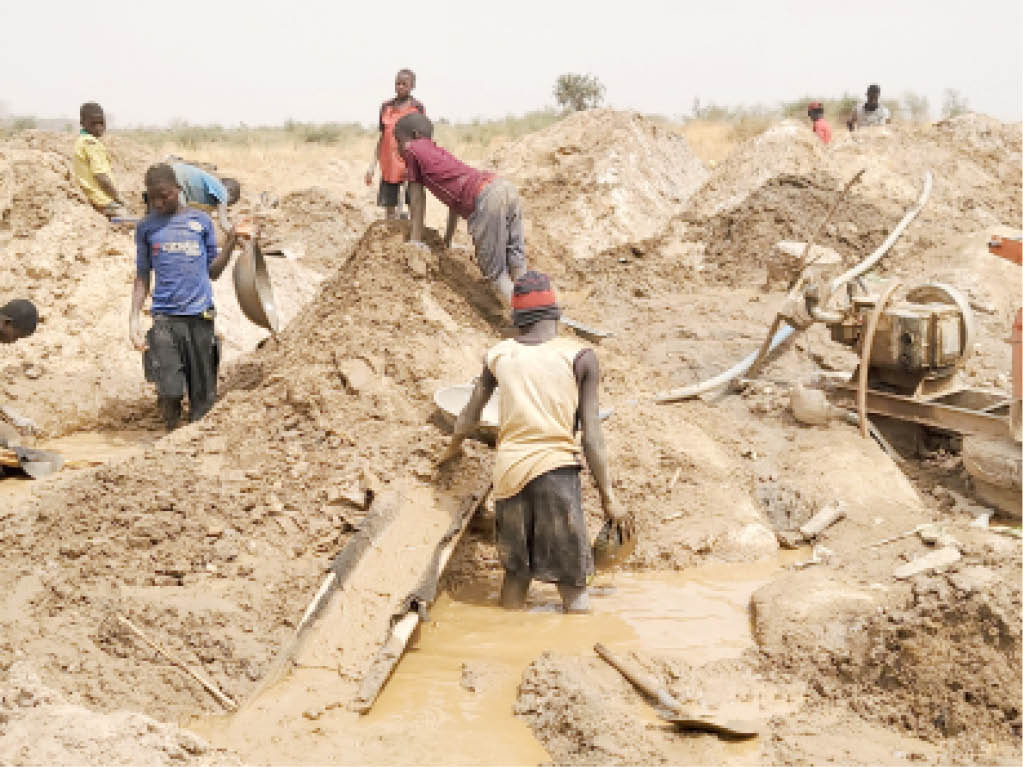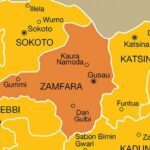Tradition and necessity are keeping local miners in the mines despite an order of the federal government stopping all mining activities in the troubled North Western state of Zamfara, Daily Trust findings have shown.
In many communities around the ancient mining sites of Kwali, Zuzzurfa, Dareta and Bagega located in Maru, Gusau, Anka, Bukkuyum and Zurmi local government areas (LGAs), artisans who have for many years mined gold and other precious stones as a means of livelihood are holding on to the sites despite effort by the police to enforce the ban placed by government.
- 2023: Group urges APC to zone presidency to South
- Kwankwaso to Ganduje: Kano people need education more than flyovers
The federal government, through the National Security Council (NCS), recently restated the ban on mining activities in the state as a way of curtailing the spate of insecurity which the government attributed to gold mining activities.
The National Security Adviser (NSA), Major General Babagana Monguno (Rtd), said the decision of the council, after its meeting presided over by President Muhammadu Buhari on March 2, 2021, was aimed at stopping “arms for gold” deals going on which fuelled banditry in that part of the country.
Gen Monguno said, “His Excellency, the president, has approved, based on our recommendation, the imposition and enforcement of a ban on all mining activities in Zamfara State with immediate effect until further notice.”
A Daily Trust reporter who visited some mining sites in the state reports that companies engaged in mining have largely vacated the state due to insecurity and the government’s order. A number of the mining sites are now inaccessible due to the activities of bandits who have occupied many forests in the state.
While licensed mining companies operating in the state have complied with the order, many artisanal miners are playing “cat and mouse” with security personnel who routinely raid such fields to arrest defaulters.
Visits to some of the mining sites show that many miners and other labourers work at both the pits and grinding sites mostly in the day time, unlike the previous practice of nearly a 24-hour operation.
Majority of the workers at the sites are young men and children. In pits tens of metres deep, the able-bodied men use anvils and hammers to scrap belts and layers of sand for possible gold deposits.
Following the steps of their forefathers, mining is in the blood of the people in these villages, where residents for generations alternate between farming and mining.
Some of the mining sites date back to over 100 years with many other sites activated during colonial administration. Modern mining co-exists with the longstanding artisanal mining in most of the villages.
The Zamfara State Commissioner for Environment and Solid Minerals, Dr Nuraddeen Isah, told Daily Trust that, “Gold mining dates back to 1902 under what was then the Northern Protectorate. Gold mining helped the then Northern Protectorate under the British colonialists. Some of the mines were in Kwali, Bukkuyum, Zuzzurfa, Maikwananga, Kamfani, Maru; and many other towns.”
Dr Isah said between 1935 and 1942 according to the records of geological activities in the Northern Region, the mines used to produce about 400,000 ounces of gold per month.

Adamant villagers
With the ban enforced on mining in Zamfara, activities have slowed down at most sites as majority of those engaged in artisanal mining have either left for their places of origin or travelled to other places in search of alternative means of livelihood, but a number of others still hang around the mines; scavenging for what to live on.
Middle-aged men defy police raids and possible attacks by bandits to venture into the mines for treasure hunt; rummaging through the excavated sands in search of the precious stones.
The only machinery used by the local miners are crushers and water pumps which supply water to separate sand from gold.
Some, working in villages along Gagare River and local streams, use shovels and bowls in sifting through the sand in search of the gleaming treasure.
Some of the miners who spoke to Daily Trust said mining was a necessity for them as it remained the only means of livelihood in their areas. Some of them said they fled attacks in their villages to bigger towns where mining activities took place in search of money to sustain their families.
A resident of Maru, Mallam Labbo, told our reporter that, “The number of people have reduced because of the fear of arrest, while others have travelled to places like Lagos, Abuja and Kano to look for what to do after the government asked that all mining activities be stopped.
“It is only lately that some began to go back to the sites secretly because they have no any other option. A lot of our people did not farm or were unable to harvest their farms this year.”
Muhammadu Sani, a resident of Zurmi who moved to a village in Birnin Magaji for mining recounted how he was arrested by the police at a site three weeks ago.
Sani said, “I was new there and we were only struggling to find what we could buy food for our families, but they came and arrested all of us. On the day we were arrested, what the three of us earned after spending the whole day at the site was N1,600.”

Alleged secret mining
Aside the villagers, some of the sources who spoke to Daily Trust alleged that some high profile persons close to government in the state were being given security cover to deploy their men to work at some sites.
At Kwali in Bukkuyum LGA, for example, a resident of a nearby village told our reporter that policemen escorted about 20 workers every day to the site in Kwali who were said to be working for a prominent businessman close to Gov Bello Matawalle.
However, both the state police command and the state government described the allegation as false.
Police spokesman in the state, SP Shehu Mohammed, said the police were deployed to Kwali and other sites to ensure compliance with the banning order and not to give cover to anybody to indulge in the activity.
The Commissioner for Environment and Solid Minerals also denied the allegation, saying neither the governor nor anyone close to him was engaged in mining activities, challenging those with contrary facts to make them public.
He said, “As far as the state government is concerned, and my office, I have no recollection of anybody coming through me, or any directive from the government to take anybody to any site. I challenge anybody in this country…It’s a big lie. If you say people are saying, well, you don’t build government on heresy. You build government on facts and figures and things that are very honest.”
We’re enforcing ban – Police
The Zamfara State Police Command said it was working hard to ensure absolute compliance with the ban order.
Its spokesman, SP Mohammed, said aside its men on ground, the command recently got additional men dedicated to the enforcement of the ban and addressing the challenge of rural banditry in the state.
SP Mohammed said, “The Inspector General of Police (IGP) sent in a special unit in November last year comprising operations and intelligence officers as anti-illegal mining task force,” adding that the task force had men deployed to all the LGAs where mining took place.
In addition, he said the police high command posted about 300 mobile policemen to the state last month who were posted mainly to villages and mining areas.
How ban is affecting us – Gold traders
The spokesman of the Zamfara Gold Buyers and Sellers Cooperative Union (ZGBSC), Alhaji Ayuba Ahmad Muhammad, said business activities at the gold market had ebbed because of scarcity of the commodity.
Alhaji Muhammad said, “The ban has contributed negatively to our business. We are used to being here in our state and getting the little that we are able to get, but now work has been stopped. Most of our people, including the labourers, have to travel far to other states to be able to sustain themselves.”
He said some of the people engaged in gold mining and business had also moved to places like Arlit in Niger Republic, further explaining that the ban was likely to aggravate insecurity due to disengagement of hundreds of miners from their source of income.
He, therefore, called on the federal government to rethink its decision, as he insisted that there was no connection between those who engaged in mining activities and bandits operating in the state.

 Join Daily Trust WhatsApp Community For Quick Access To News and Happenings Around You.
Join Daily Trust WhatsApp Community For Quick Access To News and Happenings Around You.


